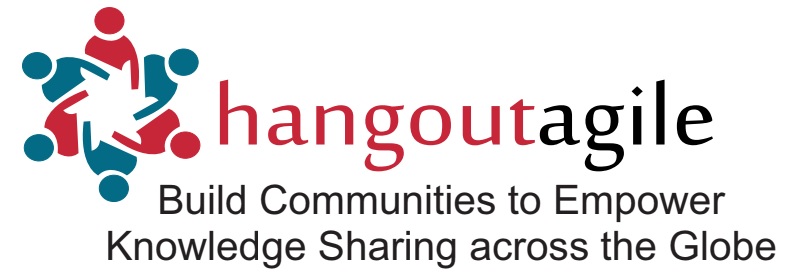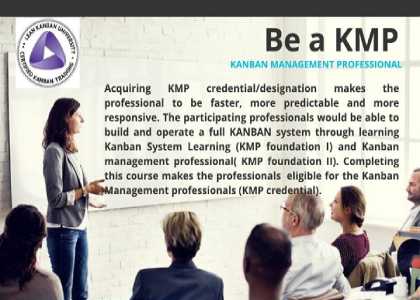Why Agile Kanban Deep Learning is Worth:
I have come across number of rumours exists with Kanban. Still, some of my fellow professionals believe that learning bits and pieces of Kanban is enough. But as it is rightly said; “little knowledge is dangerous”. Experts who have been through any agile implementation can understand the importance of Kanban deep learning. In this article, I have tried to develop the basic awareness for my fellows about the purpose of learning KMP-I OR Kanban System Design. Before going through it, I have listed down some delusion that have surrounded the advantages of Kanban.
- Kanban is Agile without timeboxes/sprints
- Kanban is Scrum without iterations
- Kanban is Scrum without sprint
- Better to start with Scrum and then start with Kanban
- Scrum and Kanban are Mutually Exclusive Options
- Kanban Means No Iterations
- Kanban for support and Scrum for development
- Kanban is only for maintenance/enhancements
- In Kanban, you do not estimate
- Kanban is not suited for innovation
- There is no burndown in Kanban
- There cannot be a Scrum Master in Kanban
- Lean and Kanban are two different methods
- Kanban is only for manufacturing
- If you are using a card board, you are doing Kanban
- Kanban can be used only by small teams
- Kanban is just another hype
- Kanban is incompatible with regulatory requirements
- Kanban requires that all work items be of the same size
- Kanban is a form of project management
- Kanban results in fewer employees
- Using Kanban Requires Establishing a New Process
- Kanban is not really a workflow method – it is a process improvement tool
- Kanban singles out the process steps that we like and lets us omit the ones we don’t
- There is no breathing room in Kanban
- Kanban only supports linear processes
- WIP limits remove flexibility and ability to respond quickly
- Kanban cannot work because explicit policies make no sense in the Agile world
- Explicit policies are static, hard to change and/or inflexible
- Kanban doesn’t encourage teamwork
- Lean Development is a prescriptive approach to work in social systems
- Kanban has been successful because it is being done by early adopters
- Kanban doesn’t respect people as much as other agile methods
- Kanban doesn’t attend enough to people
- Kanban results in teams not changing
- To make great changes you need to be revolutionary while Kanban is evolutionary
I have been enquired various times during my Lead Talk, Key Note Sessions, Consulting, Coaching and various Training, ‘What is there to Deep Learn in Kanban?’ And My Answer always is, ‘The unforeseen,’ because without Deep Learning we’re just looking at the tip of the iceberg; we’ve just scratched the surface.
Are you willing to eliminate the surrounded delusions around Kanban, leave the old ways back and learn the new ways of working?
Please Join our Next batch of Kanban System Design (KMP-I) at your location OR Write to Nadia@diaame.com for more details.
What is this course?
This is a highly interactive two-day course accredited by the Lean-Kanban University (LKU) and provides in-depth training in Kanban practices and the principles that underpin the Kanban method, including a fully immersive Kanab simulation.
The Kanban method is an evolutionary approach to change and change management by starting with what you already do; respecting current roles; responsibilities and job titles; encouraging acts of leadership at all levels, and agreeing to pursue incremental, evolutionary change that evolves business processes.
It deploys Kaizen approach that reduces the risks associated with complex change programmes.
What will you learn?
Participants will learn & gain sufficient knowledge about the Kanban Method and related topics to:
- Lead or guide a team in their adoption of Kanban – from initial visualization and the design of Kanban systems through to evolutionary change
- Answer questions and support the team in day-to-day operation
iii. Help teams to identify and resolve hindrances to flow
- Take measurements and create meaningful metrics that helps the team
- Evolve process and practice according to team needs, in a meaningful way
- Connect with the Kanban community for the sharing of practical experiences and the development of new ideas and techniques
vii. Identify internal and external sources of dissatisfaction
viii. Analyse demand vs capability
- Model the knowledge discovery process
- Design kanban systems and their visualisations
- Identify/prioritise improvements
xii. Choose cadences for activities
xiii. Identify classes of service
xiv. Create a roll-out plan, negotiating strategy with stakeholders
What will you receive?
- Course materials
- Membership of the Lean-Kanban University (LKU)
iii. Lean-Kanban University (LKU) certificate of course completion
- Fulfilment of the Kanban Management Professional 1 (KMP1) requirements
- A free electronic copy of David Anderson’s “Kanban: Successful Evolutionary Change for Your Technology Business” book
- 16 Scrum Education Units (SEU’s) can be claimed for this course and used as part of your Scrum Alliance Certified Scrum Professional application.
vii. 16 Professional Development Units (PDU’s) can be claimed for this course and used as part of retaining your Professional application.
What are the topics covered?
- Kanban Introduction
✓ What is Kanban?
✓ Kanban with a big ‘K’ and little ‘k’
✓ Kanban to Manage Change:
o Kaizen
o Kaikaku
✓ Principles of the Kanban Method
✓ Kanban Core Practices
✓ When is Kanban Typically Used?
- Identify Work Items:
✓ Demand Analysis
✓ Handling Large Work Items
✓ Kanban Cards
✓ Sizing Work Items
iii. Value Streams
✓ What is a Value Stream
✓ Mapping the Knowledge Discovery Process through Value Stream Mapping
- Kanban Boards
✓ The Relationship between a Kanban Board and the Value Stream
✓ Setting up and using a Kanban Board
✓ Different Options for Kanban Boards
✓ Queues and Buffers
- Limit Work In Progress (WIP)
✓ Queuing Theory – Little’s Law
✓ Calculating Lead Time
✓ Calculating Throughput
✓ Calculating WIP
✓ Calculating Release Time
✓ Why Limit WIP
✓ Techniques to Limit WIP
✓ Where to Apply WIP Limits
- Make Management Policies Explicit
✓ Definition of ‘Done’
✓ Classes of Service
✓ Cost of Delay
✓ Service Level Agreements
vii. Measuring and Managing Flow
✓ Cumulative Flow Diagrams in Relation to Kanban
✓ How to Produce a Cumulative Flow Diagram
✓ How to Measure Lead Time
✓ How to Measure WIP
✓ How to Measure Flow
✓ Optimising Flow
✓ How to use the Cumulative Flow Diagram to Identify Problems
✓ Five Focusing Steps to Remove Bottlenecks
✓ Interpreting a Control Chart
✓ Interpreting a lead time distribution chart
viii. Sources of Variability
✓ Sources of dissatisfaction
✓ The impact of variability
✓ Techniques and strategies for removing variability
- Empirical Feedback
✓ Improvement Kata
✓ Cadence and Rhythm
✓ Daily Stand-ups
✓ Retrospectives
✓ Operations Review
- Apply your learning
✓ Team-Based Realistic Simulation of a Kanban System in Practice
- Kanban in your Organisation
✓ The Context for Change
✓ The Steps required to Build a Kanban system
✓ Apply a Kanban System to your Organisation
✓ Prepare a Roll-Out Plan for your Organisation
Who is this course suitable for?
- Anyone who wants to be successful using Kanban within their organisation, or anyone who works with teams utilising Kanab.
- It will be helpful to both beginners and those who have explored Kanban, but now want to consolidate their knowledge in a practical setting.
iii. In terms of roles, the course is suitable for Top Management, Product, Project and Programme Managers, Development Team Members (including but not limited to Architects, Designers, Developers, and Testers), Business Analysts, Agile Coaches, Scrum Product Owners and Scrum Masters who want to enhance their Lean / Agile skillset.
- Attending the course as a full team offers a real opportunity for the entire team to experience and learn Kanban together and creates an excellent foundation for them to move forward.
Are there any prerequisites for this course?
There are no prerequisites for the course; however students are expected to complete the required pre-course reading.
How should you prepare for this course?
Approximately one week before the training a pre-course email will be issued that contains some short research tasks.
This course has been accredited by David J Anderson (creator of the Kanban method) and Lean-Kanban University (LKU). Students taking a LKU-accredited course will be eligible to become members of the Lean-Kanban University and will have met the requirements of the Kanban Management Professional 1 (KMP1) designation.


